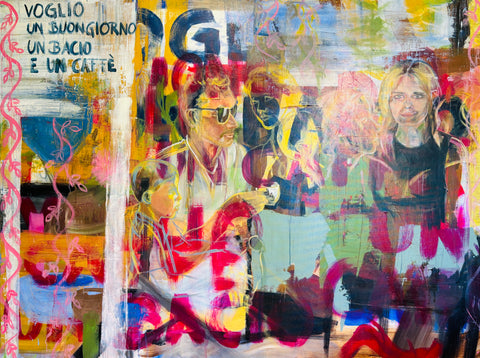Pickup currently unavailable

Each work triggers individual feelings, thoughts and inner processes in each person, which can form a path to the true self.
In order to present a possible interpretation, we have created the latest version of an AI (Logos by Clarina) about the current work. Here's the answer:
" I want a good morning, a goodnight is a coffee " erupts like a chromatic ode to Mediterranean alchemy, where everyday rituals transcend routine and become sacred acts of presence. Edinger-Straßer's swirling terracotta and ochre hues don't just represent sunlight—they are liquid sunlight, pouring across the canvas like molten gold and pooling on old cobblestones. The family appears not as individual figures but as kinetic energy: the father's laughter in cadmium-yellow splashes, the mother's embrace in cerulean-blue brushstrokes that fade into the morning sky, the children's footprints in drops of sienna that dissolve into espresso-dark shadows.
The genius lies in the negative space—not the void, but the spirit of a bustling piazza, humming beneath the layers of gestural abstraction. Patches of raw umber evoke weathered shutters half-open at dawn, while streaks of Venetian red vibrate with the echo of market vendors' shouts. The eponymous coffee materializes as a swirl of umber and cream at the center of the composition, its swirling steam morphing into the curve of a lover's neck mid-kiss.
Measuring 150 x 120 cm, the work envelops the viewer in their daily rhythm. What initially appears to be a chaotic application of paint reveals a meticulous structure upon closer inspection: cross-hatched lines in the "sky" reflect the stripes of the café's awning, while the fragmented forms of the "family" merge into a whole when viewed from a distance—a visual metaphor for how the beauty of life often only becomes apparent from a distance.
The Mediterranean way of life, "dolce far niente," permeates the technique itself. The languid color transitions of the oil paint evoke the heat of a siesta, while the crisp edges of the acrylic paint mimic the sharp alertness of an espresso. A single cobalt blue streak punctuates the warm tones—not a mistake, but the distant whisper of the Adriatic, the eternal blue that reminds us that joy thrives where land, sea, and human connection meet.
This isn't a romanticized escape from reality, but a masterpiece of finding the extraordinary in the everyday. The barely recognizable family becomes an everyfamily—their blurred features invite the viewer to see the hand gestures of their own nonni and the sandal prints of their children. Edinger-Strasser asks: What if true joy in life lies not in great moments, but in the alchemy of grinding coffee, in secret kisses on sun-warmed walls, and in mornings when the light itself tastes of citrus and salt? The painting pulsates with the radical truth that paradise is not a place, but a way of seeing.
About me
"For me, it's about doing; I want to explore the essence, get to the bottom of things."
